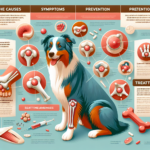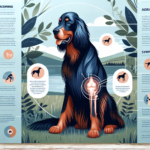Anatolian Shepherd Dog Joint Pain: Causes, Symptoms, Prevention, and Treatment
Introduction
The Anatolian Shepherd Dog, a breed with ancient roots, is known for its impressive size, strength, and protective instincts. Originating from the Anatolian region of Turkey, these dogs were historically used as livestock guardians, protecting flocks from predators. They are characterized by their large, muscular build, thick double coat, and a calm yet vigilant demeanor. Despite their robust appearance, Anatolian Shepherds are prone to certain health issues, with joint pain being a significant concern.
Joint health is crucial for the Anatolian Shepherd Dog due to their large size and active lifestyle. Joint pain can severely impact their quality of life, making it essential for owners to be aware of the causes, symptoms, preventive measures, and treatment options available for managing this condition.
Breed-Specific Joint Pain Risks
Genetic Predisposition
Anatolian Shepherd Dogs are genetically predisposed to several joint-related issues, including hip dysplasia, elbow dysplasia, and arthritis. Hip dysplasia, a condition where the hip joint does not fit properly into the hip socket, is particularly common in large breeds like the Anatolian Shepherd. Elbow dysplasia, which involves abnormal development of the elbow joint, can also be a concern. Arthritis, a degenerative joint disease, often develops as a secondary condition to these dysplasias.
Age-Related Risks
As Anatolian Shepherds age, the risk of joint pain increases. While young dogs may show early signs of joint issues, such as hip or elbow dysplasia, older dogs are more likely to develop arthritis. Owners should be vigilant about joint health as their dog reaches middle age, typically around 5-7 years, and continue monitoring into their senior years.
Activity Level and Joint Stress
Anatolian Shepherds are active and hardworking dogs, often used for guarding livestock or as family protectors. Their high activity level can put significant stress on their joints, especially if they are involved in strenuous activities like running, jumping, or climbing. This constant joint stress can exacerbate existing conditions or lead to new joint issues over time.
Common Symptoms of Joint Pain in Anatolian Shepherd Dogs
General Symptoms
- Limping or favoring one leg
- Stiffness, especially after rest or sleep
- Reluctance to move, jump, or climb stairs
- Decreased activity or playfulness
- Swelling around the joints
- Whining or showing signs of pain when touched
Breed-Specific Symptoms
In Anatolian Shepherds, joint pain may manifest as a reluctance to perform their guarding duties or a noticeable decrease in their usual alertness and activity levels. Owners may also observe a change in their gait, with the dog appearing to walk more stiffly or awkwardly.
When to Consult a Vet
If an Anatolian Shepherd shows any signs of joint pain, it is crucial to consult a veterinarian promptly. Early intervention can prevent further deterioration and improve the dog’s quality of life. Persistent limping, noticeable pain, or any sudden changes in behavior should be addressed immediately.
Preventive Measures for Joint Health
Exercise Recommendations
Regular, moderate exercise is essential for maintaining joint health in Anatolian Shepherds. Activities like walking, swimming, and controlled play can help keep their joints flexible and muscles strong without causing excessive stress. Avoid high-impact activities like jumping or running on hard surfaces, which can exacerbate joint issues.
Dietary Suggestions
A balanced diet rich in essential nutrients is vital for joint health. Foods containing glucosamine, chondroitin, and omega-3 fatty acids can support joint function and reduce inflammation. Consider incorporating supplements specifically designed for joint health, but always consult a veterinarian before making any dietary changes.
Weight Management
Maintaining a healthy weight is crucial for reducing joint stress in Anatolian Shepherds. Excess weight can put additional pressure on the joints, exacerbating pain and leading to further complications. Regular exercise and a balanced diet are key to keeping your dog at an optimal weight.
Early Screening and Monitoring
Regular veterinary check-ups and early screening for joint issues can help catch problems before they become severe. X-rays and other diagnostic tools can identify conditions like hip or elbow dysplasia early on, allowing for timely intervention and management.
Treatment Options for Joint Pain
Non-Surgical Treatments
Non-surgical treatments for joint pain in Anatolian Shepherds include medications, physical therapy, and lifestyle adjustments. Anti-inflammatory drugs and pain relievers can help manage symptoms, while physical therapy can improve joint function and mobility. Lifestyle changes, such as providing a comfortable bed and avoiding strenuous activities, can also alleviate pain.
Surgical Options
In severe cases, surgical intervention may be necessary. Common surgeries for joint issues include hip replacement, arthroscopy, and corrective osteotomy. These procedures can significantly improve the dog’s quality of life, but they come with risks and require a thorough discussion with a veterinarian.
Alternative Therapies
Alternative treatments like acupuncture, hydrotherapy, and massage can provide additional relief for joint pain. Acupuncture can reduce pain and inflammation, while hydrotherapy offers low-impact exercise that strengthens muscles without stressing the joints. Massage can improve circulation and reduce muscle tension around the affected joints.
Lifestyle and Management Tips
Daily Care Routine
A daily care routine for an Anatolian Shepherd with joint pain should include gentle exercise, a balanced diet, and regular monitoring of their condition. Short, frequent walks and low-impact activities like swimming can keep them active without causing additional pain. Ensure they have a comfortable place to rest and avoid activities that put excessive strain on their joints.
Modifying the Home Environment
Making the home environment more comfortable for a dog with joint pain can significantly improve their quality of life. Consider using ramps instead of stairs, providing orthopedic beds, and ensuring that food and water bowls are at an accessible height. Non-slip mats can also help prevent falls and reduce joint strain.
Long-Term Management
Long-term management of joint pain involves regular veterinary check-ups, ongoing monitoring of the dog’s condition, and adjustments to their care routine as needed. Consistent use of medications, supplements, and alternative therapies can help manage pain and maintain joint health. Keeping the dog active and engaged with appropriate activities is also crucial for their overall well-being.
FAQs About Anatolian Shepherd Dogs and Joint Pain
What are the early signs of joint pain in Anatolian Shepherds?
Early signs of joint pain include limping, stiffness, reluctance to move, and decreased activity levels. Owners may also notice swelling around the joints or changes in the dog’s gait.
Can joint pain in Anatolian Shepherds be prevented?
While genetic predispositions cannot be entirely prevented, maintaining a healthy weight, providing regular exercise, and ensuring a balanced diet can significantly reduce the risk of joint pain. Early screening and monitoring can also help catch issues before they become severe.
Are there specific exercises that are better for Anatolian Shepherds with joint pain?
Low-impact exercises like walking and swimming are ideal for Anatolian Shepherds with joint pain. These activities help maintain joint flexibility and muscle strength without causing excessive stress.
What dietary supplements are recommended for joint health in Anatolian Shepherds?
Supplements containing glucosamine, chondroitin, and omega-3 fatty acids are beneficial for joint health. Always consult a veterinarian before adding any supplements to your dog’s diet.
When should I consider surgery for my Anatolian Shepherd’s joint pain?
Surgery should be considered when non-surgical treatments are no longer effective, and the dog’s quality of life is significantly impacted. A thorough discussion with a veterinarian is essential to determine the best course of action.
Conclusion
Joint pain is a significant concern for Anatolian Shepherd Dogs, given their size and active lifestyle. Understanding the causes, symptoms, preventive measures, and treatment options is crucial for maintaining their joint health and overall well-being. By taking proactive steps, such as providing appropriate exercise, a balanced diet, and regular veterinary care, owners can help their Anatolian Shepherds lead happy, pain-free lives. Regular consultation with a veterinarian is essential to ensure the best possible care for your dog’s joint health.




